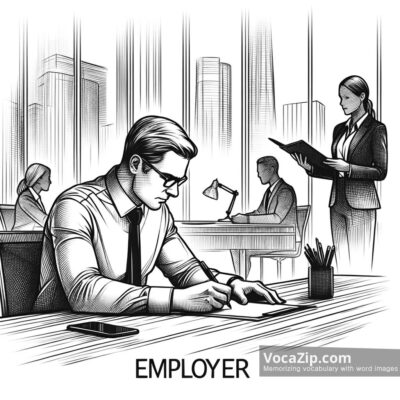employer meaning
employer :
a person or company that hires employees
noun
▪ She is a friendly employer.
▪ She is a friendly person who hires workers.
▪ The employer provides health insurance.
▪ The employer offers health insurance.
paraphrasing
▪ boss – person who hires employees
▪ company – organization that hires employees

Pronunciation
employer [ɪmˈplɔɪər]
The stress is on the second part 'ploy' and sounds like 'im-ploy-er'.
Common phrases and grammar about employer
employer - Common meaning
noun
a person or company that hires employees
Part of Speech Changes for "employer"
▪ employ (verb) – to hire someone
▪ employment (noun) – having a job
▪ unemployed (adjective) – not having a job
▪ employment contract (noun) – agreement to work
Common Expressions with "employer"
▪ current employer – the company you work for now
▪ future employer – the company you will work for later
▪ new employer – a different company you work for
▪ potential employer – a company you might work for
Important examples of employer in TOEIC
Vocabulary examples from the TOEIC test
In TOEIC vocabulary questions, employer is usually used to refer to a person or company that hires employees.
Example of a confusing word: employee (a person who is hired)
Grammar examples from the TOEIC test
In TOEIC grammar questions, employer is used as a noun and often appears as the subject or object in a sentence.
employer
Idioms and fixed expressions in TOEIC
employer branding
how a company promotes its image as a good employer.
employer of record
a third party that hires and pays employees on behalf of another company.
Differences between similar words and employer
employer
,
boss
differences
employer refers to a person or company that hires, while boss refers to the specific person in charge.
employer
,
company
differences
employer refers to the person or company hiring, while company refers to the whole business entity, not just the hiring part.
Words with the same origin as employer
The origin of employer
employer comes from the verb 'employ', which means to hire someone for work.
Word structure
The word is made of the root 'employ' and the suffix '-er', meaning 'someone who employs'.
Words with the same origin
The root of employer is 'employ'. Words with the same root include 'employment', 'employ', and 'unemployed'.
Please select an image in the quiz
Previous post and next post







